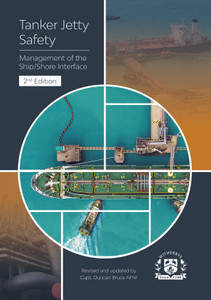
This Guide aids tanker vessel operators in achieving high standards of ship management and safety. A useful complement to IMO Conventions and Codes, this third edition has been updated to reflect current legislation and emerging issues. It incorporates feedback from companies and users of previous editions of TMSA, as well as providing guidance on OCIMF’s view of industry best practice.
Guidance has been improved to complement key performance indicators and remove ambiguity for users. This new publication includes updated industry legislative requirements, including the Ballast Water Management Convention and the Polar Code.
The streamlining of elements ensures consistency and straightforwardness in the self assessment process. The Environmental and Energy Management Element has also been revised to incorporate the OCIMF Energy Efficiency and Fuel Management paper that was a supplement to TMSA2.
The OCIMF Tanker Management and Self Assessment (TMSA) programme consists of a book, a matching online tool for recording the self assessment and a database for sharing reports. In February 2017 TMSA was integrated into the Ship Inspection Report Programme (SIRE).
The TMSA programme complements IMO Conventions, Codes and Circulars and is intended to encourage self-regulation and promote continuous improvement to enhance the safety of merchant shipping. Implementation of IMO Conventions, Codes and Circulars is achieved by companies establishing an effective safety management system (SMS), covering both ship and shore management processes. An effective SMS is also required for companies to achieve HSSE excellence.
The TMSA encourages companies to assess their own SMS against set key performance indicators (KPIs) and provides a minimum expectation (level 1) and three further levels of increasing best practice guidance, which a company may wish to apply in their SMS to improve ship management safety performance. Through self assessment, companies are encouraged to use ship management assessment results to develop phased improvement plans that can be applied across their entire fleet and to share their TMSA self assessments with potential charterers using the TMSA database.
The TMSA offers a standard framework for assessment of a company’s SMS. It sets out 13 elements of management practice that are essential for the effective management and operation of vessels. Companies can measure their SMS against the KPIs in each element and decide whether they have achieved a particular level in that element and, therefore, provide a clear, objective picture of performance. Importantly, the levels in the TMSA help the company identify gaps in current performance and areas where performance can be enhanced.
Glossary
Abbreviations
Section
one
The
Tanker
Management
and
Self
Assessment
Programme
1.1
Introduction
1.2
Continual
improvement
1.3
Key
performance
indicators
1.4
Self
assessment
process
1.5
Verification
process
1.6
Submitting
reports
Section two The TMSA elements
Element
one
Leadership
and
the
Safety
Management
System
1
Management,
Leadership
and
Accountability
1A
Developing
and
Maintaining
a
Safety
Management
System
Element two Recruitment and Management of Shore-Based Personnel
Element
three
Recruitment,
Management
and
Wellbeing
of
Vessel
Personnel
3
Recruitment
and
Management
of
Vessel
Personnel
3A
Wellbeing
of
Vessel
Personnel
Element
four
Vessel
Reliability
and
Maintenance
including
Critical
Equipment
4
Vessel
Reliability
and
Maintenance
4A
Vessel
Reliability
and
Maintenance
(Critical
Equipment)
Element five Navigational Safety
Element
six
Cargo,
Ballast,
Tank
Cleaning,
Bunkering,
Mooring
and
Anchoring
Operations
6
Cargo,
Ballast,
Tank
Cleaning
and
Bunkering
Operations
6A
Mooring
and
Anchoring
Operations
Element seven Management of Change
Element eight Incident Reporting, Investigation and Analysis
Element
nine
Safety
Management
9
Safety
Management
–
Shore-Based
Monitoring
9A
Safety
Management
–
Fleet
Monitoring
Element ten Environmental and Energy Management
Element eleven Emergency Preparedness and Contingency Planning
Element
twelve
Measurement,
Analysis
and
Improvement
12
Measurement,
Analysis
and
Improvement
–
Inspections
12A
Measurement,
Analysis
and
Improvement
–
Audits
Element thirteen Maritime Security
The Oil Companies International Marine Forum (OCIMF) is a voluntary association of oil companies with an interest in the shipment and terminalling of crude oil, oil products, petrochemicals and gas. OCIMF focuses exclusively on preventing harm to people and the environment by promoting best practice in the design, construction and operation of tankers, barges and offshore vessels and their interfaces with terminals. Learn more at: www.ocimf.org
- Number of Pages:
- 106
- ISBN:
- 9781856097383
- Published Date:
- April 2017
- Binding Format:
- Hardback Spiro
- Book Height:
- 300 mm
- Book Width:
- 235 mm
- Weight:
- 1 kg
- Author:
Oil Companies International Marine Forum
- Preview:
- Yes





